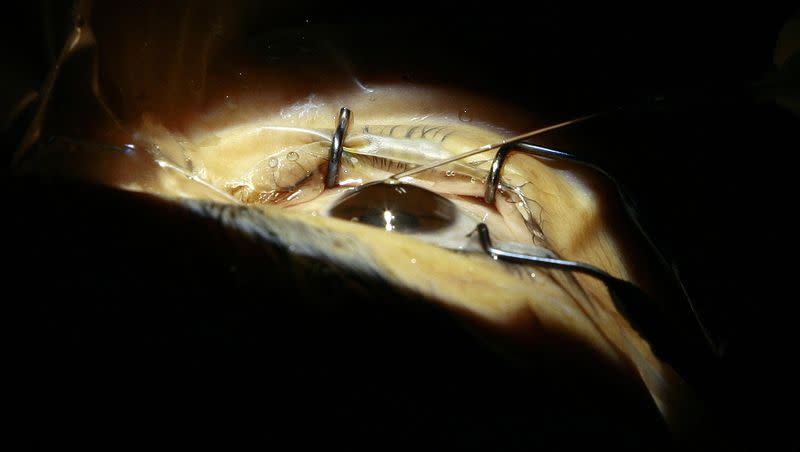Opinion: Should optometrists perform laser eye surgeries?

I am an eye patient at Moran Eye Center. The details of my condition are not important and I prefer to maintain my privacy. Suffice it to say, I am very happy to be receiving a level of care that is available only at a handful of places worldwide. We are fortunate here in Utah that we have Moran.
Because of my situation, I have obviously become very sensitive about my eyes. Having your vision threatened is a sobering event. You come to appreciate your eyes in new ways and realize how fleeting vision can be.
That is why I find SB210 disturbing. It seeks to allow nonmedically trained optometrists to perform certain “simple” laser surgeries on patients. Knowing what I now know, there are no “simple” eye surgeries, and that makes the bill unacceptable to me.
Even if the mechanics of the laser surgeries were so simple that an untrained practitioner could complete them successfully and with minimal risk, the idea still seems unwise. Ophthalmologists train for years to learn their skills. The idea that a week or two of class work and some practice on artificial eyes would equip someone to meddle with one of the human body’s most miraculous, and most fragile, systems is shocking.
Related
From my own experience, a surgical intervention is only one part of the treatment process. First, a patient must be fully and properly diagnosed. Then, with that information in hand, the individual must be screened for any unknown conditions that would make surgery inadvisable or premature. I simply cannot imagine anyone performing those tasks correctly without the rigorous years of study and practice (seven or eight years and around 17,000 hours) that go into an ophthalmologist’s preparation.
Then there is the danger of complication. It happens. Even the most skilled surgeon can encounter unforeseen difficulties post-surgery. A minimally-trained optometrist has nothing approaching the training and preparation to handle serious adverse results. So, what is left? The patient must then seek care from an ophthalmologist who will likely be seeing them for the first time.
Optometrists perform an important service. As a patient, I have needed them; as a society, we need them. An optometrist is trained to “measure” the eye. They can measure our eyes and help us correct poor vision. At times, I know they do pick up medical concerns that are beyond their training, and thankfully they refer their patients to licensed ophthalmologists. All those functions are important and valued.
But laser surgery? Without the full training necessary? This is not a good idea. We all know that there are highly trained and well-educated physical therapists available to us. They know a great deal about the anatomy and mechanical systems of the human body. They are essential to the recovery of many, many patients.
Does that mean they ought to pick up a little extra training on how to operate an arthroscope so they can perform simple knee surgeries? No, and I can’t imagine anyone would even suggest that.
I understand that optometrists do go to school and many incur debt as a result. I can understand that they would want to expand their practice, and with that, expand their revenue opportunities. What’s more, I do not say that as criticism. They need to make a living and support families just like the rest of us. I wish them well.
But this should not be a business decision, or at least, not that alone. I have paid attention to the debate over this bill and the one a couple of years ago. To me, at least, it seems that the quest for more revenue — on the part of the practitioners, as well as the for-profit optometry school that opened in Provo — is a big motivator. I want their businesses to succeed, just not at the risk of patient safety and well-being.
I’ve long believed that one way to confirm decisions is to ask yourself what you would tell your son or daughter to do if they were facing the same situation. In this case, I can say without reservation that if one of my children was considering laser eye surgery, I would never recommend that they allow a nonmedical doctor anywhere near their eyes with a laser.
My experience at Moran has taught me to appreciate the training, professionalism and care of a fully certified ophthalmologist, along with a medically-trained staff and excellent support. As far as I’m concerned, there is no cutting corners when it comes to my eyes. I encourage the Utah State Legislature to reject SB210.
Annie Cowley is a patient at Moran Eye Center. She and her husband reside in Salt Lake City.

